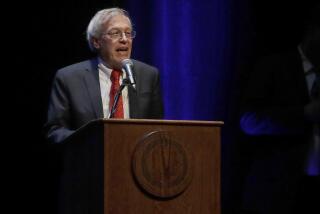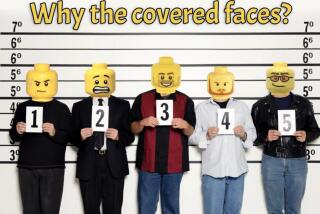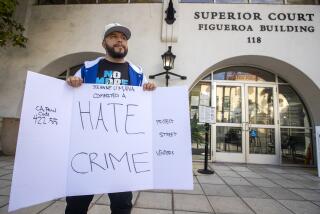Chat & Selfie: ACLU lawyer on Nazis and getting tased in the line of duty
The California section’s Bob Sipchen cornered American Civil Liberties Union attorney Peter Bibring at Justice Urban Tavern, a block from the Los Angeles Police Department’s headquarters/dog park. Appropriately, a man on the sidewalk waved a placard and ranted about something. If body cameras had been worn, they would have revealed that Bibring wore pale green sneakers. After lunch we emailed him a few questions and crunched the conversation into this:
You graduated from Harvard and NYU law school but couldn’t hack physics at Caltech. West Coast schools are harder, right?
It’s definitely easier to spend your entire waking existence in a library when it’s 20 degrees outside.
Hate speech, pro or con?
I disapprove of your crazy comments, but I will defend to the death your right to make them. The government shouldn’t be in the business of stopping people from saying certain things. That doesn’t mean there aren’t limits. If one person follows another around shouting epithets about their race or gender or sexual orientation, that may cross a line into harassment or threats. But restrictions on speech itself, like school speech codes that prevent people from expressing biases, don’t address the underlying problem of prejudice.
The ACLU is working on a new app that allows people to send in videos of law enforcement officers engaged in allegedly bad behavior. How’s it work?
You open the app, push a button and it takes video like any other camera. The video immediately gets uploaded to the ACLU, so that it won’t be deleted or destroyed. The app also has a full library of ACLU know-your-rights materials. The hope is that this will help people safely document police activity, to deter any misconduct and preserve a record of misconduct if it does occur.
Why would the ACLU encourage more Orwellian surveillance of everyone’s every move?
Government watching the people is surveillance. People watching the government is part of a healthy democracy.
The ACLU has participated in litigation that has changed California’s schools, jails, public spaces and immigration policies. Why not leave that stuff up to voters?
That’s the essence of a liberal democracy. The people decide almost everything, but government establishes some basic rights that the government — even the voters — can’t take away. If voters decide absolutely everything, then marginalized communities don’t get a fair shake. As Larry Flynt said, “You can’t have five wolves and one sheep voting on what to have for dinner.”
What case that you’ve worked on will have the greatest effect on how people live in California?
In terms of the issue, I think it’s our challenge to the FBI’s surveillance of Muslim communities in Orange County. I think we’ll look back on these days in the way we look back on police red squads or the internment of Japanese Americans during World War II — as a reaction to fear that ran directly contrary to American values.
Your father fled Austria to escape Hitler. Could you defend the right of Nazis to march through Jewish neighborhoods?
Absolutely. One of my formative free-speech moments was at a Nazi rally in Boston. There were maybe six guys in Nazi uniforms parading about with a little sound system, and a couple of thousand counter-demonstrators drowning them out with deafening chants. That was a far more effective rejection of Nazism than the government preventing them from marching in the first place. The answer to offensive speech is more speech, not less.
Have you perceived any questions so far as “micro-aggressions,” and if so are you planning to sue?
You’re just lucky you’re not a government actor.
What question should we have asked but didn’t?
Have you ever been tased in the line of duty? Yeah. It hurts a lot.
More Chat and Selfie interviews from The Times’ California section
More to Read
Start your day right
Sign up for Essential California for news, features and recommendations from the L.A. Times and beyond in your inbox six days a week.
You may occasionally receive promotional content from the Los Angeles Times.






